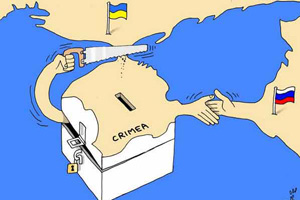
The Crimean crisis has soured the increasingly tense Russia-U.S. relations, particularly in the wake of the Syrian crisis and chemical weapons disarmament.
Many analysts have posited that the U.S. and Russia have reached an understanding about a number of global and regional issues; however, the Ukrainian crisis, which has led to rising tensions in Russian-Western relations reminiscent of the Cold War, has apparently put this to the test. The question is whether President Obama will take a step toward escalating relations with Russia by imposing additional economic sanctions and scaling down political cooperation between the two countries.
The answer to this question is not simple, as there are U.S. factions that are pushing for escalation. And since Obama lacks a clear strategy for the crisis, he may blunder more and more in his Russian policy and continue to increase economic sanctions against Russian President Vladimir Putin. However, he can’t turn back time in regard to the Crimean Peninsula. Additionally, Obama needs Russia’s help for a number of things; in the event that he raised sanctions against Russia, he would be putting other political matters — more significant to him than Crimea — at risk. To begin with, Russia has a vested interest in stability in Ukraine, similar to the way that the U.S. has a vested interest in Mexico. Moscow has undeniable and legitimate geostrategic interests in Ukraine, but not when the objective of these is to weaken Russia.
On top of that, there are a number of international and regional matters that the U.S. needs Russia’s help in contending with, and if the U.S. did not go in the direction of additional sanctions, then it risks paying a high price for that in other countries.
Among the many strategically significant issues the U.S. cannot achieve without Russia’s cooperation, three are in the Middle East:
There is the issue of Iran’s nuclear program, where the U.S. cannot achieve any progress without the important role that Russia can play as Iran’s ally. In other words, without Russia’s support, the U.S. risks Iran’s nuclear threat and a nuclear race in the Middle East, which will represent a direct threat to U.S. strategic interests in the region, as well as a threat to European economic interests.
The second issue is the Syrian crisis, where Russian diplomacy has served America’s regional interests. Indeed, if not for Russia’s intervention, it would have been unlikely that Assad would have agreed to the chemical weapons disarmament agreement. Similarly it’s unimaginable how a peaceful political resolution to the Syrian crisis would be reached without Russian-U.S. cooperation, just as it would be impossible to get to a transitional government that would guarantee the participation of all parties and combat terrorism inside Syria.
Not far from the Middle East, the U.S. is in over its head in Afghanistan, as President Obama is attempting to reduce U.S. military presence there in preparation for a full withdrawal of troops in the coming year. Currently, the U.S. depends primarily on its army extensions in Afghanistan through maritime and air transportation lines across Russia. It is likely that it will increasingly rely on Russian cooperation in the case of withdrawal, particularly to transport supplies and weapons across Russian territory and airspace.
Beyond that, the U.S. will need Russia after it withdraws from Afghanistan for Russia’s intelligence capacity, as well as for its relations with the parties in conflict, as well as with the two factions that will play an important role in establishing stability in Afghanistan after the withdrawal.
Grave dangers grip the world today, and the U.S. needs Russia’s help to contend with them. Aggravation of Russia-U.S. relations will only lead to more trouble, and it does not serve American, Western or global interests.
Crimea’s annexation is a reality, and the U.S. has neither the desire nor the means to change this. It may be wise for all parties to return to the negotiating table, since taking a step toward increasing sanctions will only make matters worse for all parties involved.

Leave a Reply
You must be logged in to post a comment.